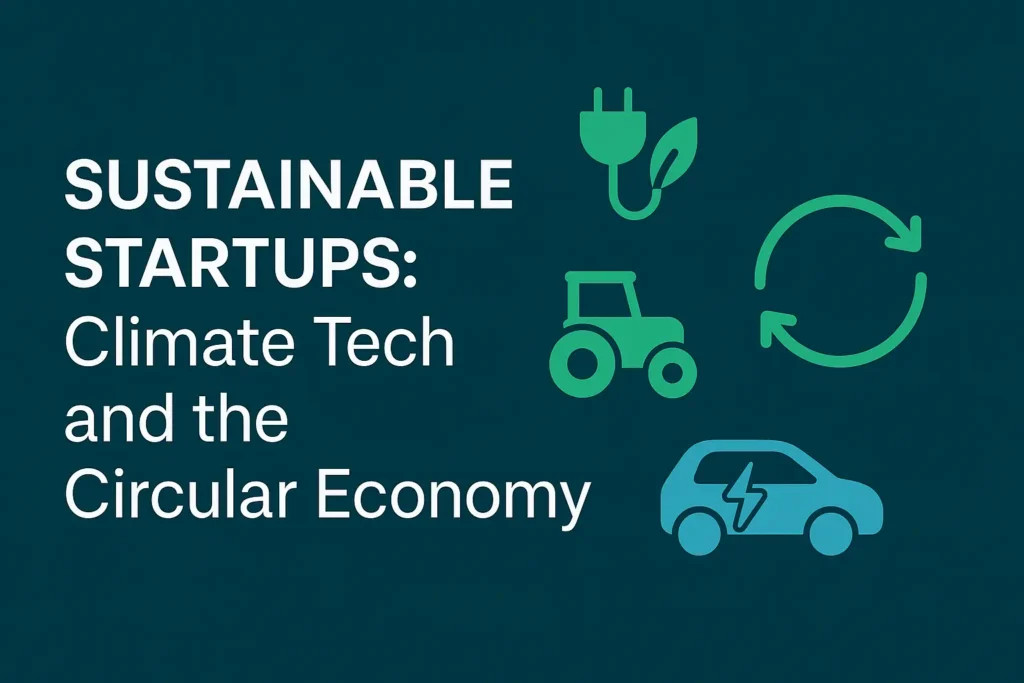Clean Energy Solutions: Powering Sustainable Startups
The surge in climate‑tech funding underscores the critical role of clean energy in the rise of Sustainable Startups. In 2023, global climate‑tech ventures attracted over $50 billion, with U.S. companies leading at $14.6 billion and China close behind at $11.7 billion (BloombergNEF). Startups developing solar, wind, and battery storage innovations are harnessing this capital to drive the clean‑energy transition and create resilient energy infrastructures.
Climate‑Smart Agriculture: Tech‑Driven Farming Innovations
Sustainable Startups are revolutionizing agriculture with precision farming, vertical farms, and bio‑engineered crops to reduce resource use and emissions. At CES 2023, OneThir’s avocado scanner and Orbisk’s kitchen‑waste AI garnered attention for cutting food waste and associated CO₂ emissions (AP News). These technologies not only boost yields but also help farmers adapt to climate stressors, making agriculture more resilient and eco‑friendly.
Sustainable Mobility: Electric and Hydrogen‑Powered Transport
The transportation sector is rapidly decarbonizing through electric vehicles (EVs) and hydrogen fuel cells. In 2023, nearly 14 million EVs were sold globally 18 % of all cars marking a 35 % year‑over‑year jump (Road Genius). Sustainable Startups in this space range from battery‑recycling innovators like Redwood Materials to hydrogen‑truck pioneers, accelerating the shift toward zero‑emission fleets and creating new business models in mobility services.
Circular Economy Business Models: From Linear to Circular
Embracing circularity, Sustainable Startups design products and services that eliminate waste and keep materials in use longer. The global circular‑economy market is projected to reach $1.2 trillion by 2025, with Asia‑Pacific leading growth (Worldmetrics). Startups offering repair‑as‑a‑service, remanufacturing, and product‑as‑a‑service models are tapping into this vast opportunity by reducing resource extraction and driving economic value from waste.
Internet of Waste & AI Integration: Optimizing Waste Management
AI and IoT are transforming how we track and process waste. Companies like CleanHub and Recycle Track Systems deploy AI‑powered platforms and sensor networks to monitor waste streams in real time, ensuring transparency and compliance with Extended Producer Responsibility regulations (World Economic Forum). These Sustainable Startups help brands verify plastic collection, reduce landfill reliance, and turn waste into valuable feedstock for new products.
Bio‑Based Materials and Sustainable Packaging Innovations
To replace fossil‑derived plastics, Sustainable Startups are developing bio‑based materials and compostable packaging. The bioplastics market within the circular economy is expected to grow at a CAGR of 10.3 % through 2027 (Worldmetrics). Innovations include mycelium‑based foams, algae‑derived films, and sugarcane‑based polymers, which cut carbon footprints and meet rising consumer demand for eco‑friendly packaging.
Digital Product Passports: Enhancing Supply Chain Transparency
Digital Product Passports (DPPs) are set to become mandatory across the EU by 2030 under the Ecodesign for Sustainable Products Regulation, empowering Sustainable Startups to showcase lifecycle data via QR codes (GS1 in Europe, Osborne Clarke). By embedding DPPs, startups can differentiate their offerings through traceable material origins, verified carbon footprints, and end‑of‑life recyclability, fostering trust among consumers and regulators alike.
Carbon Data & Analytics: Measuring Impact and Driving Decisions
Accurate carbon accounting is vital for Sustainable Startups aiming to prove their environmental credentials. The carbon‑analytics sector is expanding rapidly, supporting organizations in quantifying emissions across scopes 1, 2, and 3, and linking financial flows to climate impact (Vogue Business). Advanced dashboards and blockchain‑enabled registries enable startups to optimize operations, secure green financing, and validate sustainability claims to stakeholders.
Conclusion
By focusing on these high‑traction areas – clean energy, climate‑smart agriculture, sustainable mobility, circular‑economy models, waste‑tech integration, bio‑materials, digital transparency, and carbon analytics entrepreneurs can position their Sustainable Startups at the forefront of the green economy. Each segment offers significant market potential, backed by robust funding trends and supportive regulations, ensuring that solutions built today can scale tomorrow and drive systemic change toward a sustainable future.
More in Business Insider
